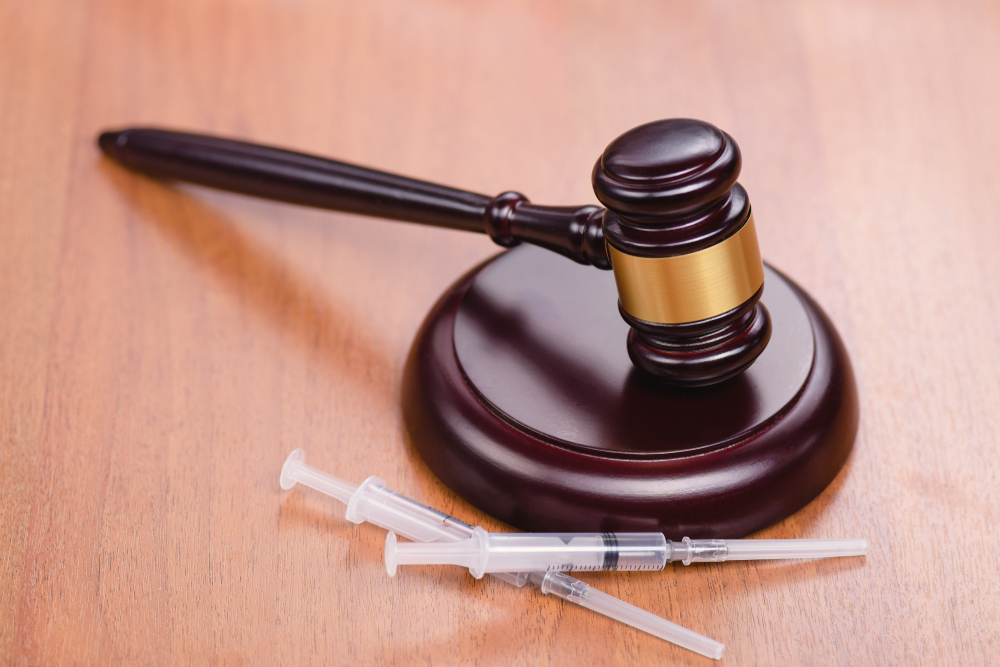By the end of 2021, New York is expected to become the first state to implement a ban on the use of a controversial weedkiller on state property. While the state’s ban would be the first in the nation, New York lawmakers and advocates are hardly the first to call for regulation on glyphosate, better known by the brand name “Roundup.”
More than 100,000 lawsuits have been filed alleging that Roundup, the most popular weedkiller ever, causes cancer. The company that makes Roundup has proposed a settlement offer that would end most of those cases, as well as ones that have yet to be filed.
Roundup is popular for residential lawncare, but it is also widely used in agriculture, including here in New York, where about 20% of the state’s land is dedicated to farms, orchards, and other agricultural operations.
Farming brings in billions to New York every year, and the state is the second biggest producer of apples in the country.
What should New York residents know about the history of Roundup, class-action lawsuits that have been filed over the product, and the research into whether the weedkiller causes cancer?
What Does Roundup Do?
The active ingredient in Roundup is a chemical called glyphosate. Before a Monsanto scientist discovered it could kill plants, glyphosate had long been used in the commercial plumbing and HVAC industry to clear calcium buildup from pipes, boilers, and other equipment.
But in 1974, Monsanto patented glyphosate as a non-selective herbicide under the name Roundup. Shortly after it was introduced, the product became a smash hit, and it would eventually become the best-selling herbicide in history.
As a non-selective herbicide, glyphosate kills all plants it is sprayed on. It is believed that the way glyphosate kills plants is by halting production of an enzyme necessary for growth. This biological process does not occur in humans or mammals, and for this reason Monsanto, along with its parent company, Bayer, have maintained that the product cannot harm anything but plants.
Roundup is popular for commercial, agricultural, and residential uses, but it is not known exactly how much of it has been used since it was introduced in the 1970s. Still, one study estimated that about 3.5 billion pounds have been used, taking all purposes into account.
Many people probably have a bottle or two of Roundup in their garage, and it’s very popular in commercial landscaping and groundskeeping. But for sheer volume, neither use compares to agriculture, and this is one reason why many people across New York and the country have become so concerned about it.
Glyphosate Use in New York
According to estimates from the U.S. Geological Survey, almost 20 million pounds of glyphosate have been applied for farming purposes in New York over the past few decades.
Let’s take a closer look at farming and glyphosate in New York:
- Since 1992, more than 18.5 million pounds of glyphosate have been applied to New York farm fields. Iowa and Illinois rank first and second thanks to their corn and soybean production.
- In 2017, the most recent year with available data, about 1.1 million pounds of glyphosate were used in New York, which ranked 33rd among all states in terms of use.
- Glyphosate is the most commonly used herbicide or pesticide in New York agriculture —used at nearly double the rate of its closest competitor.
- Corn (62%) and soybeans (35%) combined to account for nearly all the glyphosate used in New York in 2017.
Is Roundup Dangerous?
The U.S. Environmental Protection Agency (EPA) lists glyphosate as unlikely to cause cancer, reaffirming this position as recently as 2020. All herbicides and pesticides undergo regular examination by the EPA, and glyphosate has consistently been determined by the EPA not to be unsafe.
However, that view is not shared by everyone, and even the EPA itself has not always held this position. In 1985, an EPA panel determined that there was ample evidence to suggest that glyphosate was a possible carcinogen, but regulators were convinced to change their position in 1991.
But a growing chorus of voices suggests that glyphosate and Roundup are far from safe. Here’s a look at those individuals and groups who share this concern:
- As we mentioned, New York has adopted a measure to ban the use of Roundup on state-owned properties, and it’s expected to go into effect on Dec. 31, 2021.
- Three of the 100,000-plus cases pending have gone to trial so far, and all three have resulted in jury verdicts awarding plaintiffs sums in the billions of dollars. Each of the three awards have been reduced on appeal, but the verdicts themselves haven’t.
- A World Health Organization agency focused on cancer began listing glyphosate as a probable carcinogen in 2015.
- The California Office of Environmental Health Hazard Assessment formally classifies glyphosate as a probable carcinogen, and dozens of public entities across the state, including the University of California system, have banned or limited use.
- German lawmakers are considering phasing out agricultural use of glyphosate by 2024, and it has been fully banned in Luxembourg, Mexico, Thailand, and Vietnam.
- A study by University of Washington researchers found that glyphosate exposure increases the risk of non-Hodgkin lymphoma, which is the cancer suffered by each of the plaintiffs in the trials to proceed so far. The study found that the risk increased by as much as 41% among those exposed.
Roundup and Non-Hodgkin Lymphoma
Let’s explore what New York residents should know about non-Hodgkin lymphoma (NHL), including symptoms to look out for if they or loved ones have used Roundup or glyphosate.
Symptoms vary by person and usually are influenced by how advanced the cancer is, but here are the most common signs of NHL:
- Chest pain
- Cough
- Chills
- Easy bruising
- Fatigue
- Fever
- Frequent, severe infections
- Night sweats
- Shortness of breath
- Swollen abdomen
- Swollen lymph nodes
- Weight loss
About 82,000 people in the U.S. are expected to be diagnosed with non-Hodgkin lymphoma this year, according to statistics from the American Cancer Society. They also project that about 21,000 people will die from this type of cancer every year. NHL accounts for about 4% of all cancer cases in a typical year, meaning while it is somewhat unusual, it is not exactly rare.
As is the case with most forms of cancer, early detection is the key to survival. Statistics indicate that about 73% of people diagnosed with NHL in the earliest phase should live at least five years after diagnosis. But if the cancer is not detected until after it is spread, the rate falls to 57%.
If you show any of the above symptoms and believe that you may have developed NHL as a result of exposure to Roundup, you should immediately seek medical treatment.
What Is the Current Status of Roundup Litigation?
It is unclear what effect New York’s ban on glyphosate on state-owned property will have on litigation over the product and the companies that produce it. That said, there so far have been more than 100,000 cases filed over Roundup, including the three verdicts we mentioned earlier.
Importantly, while the juries in those cases all agreed with the plaintiffs that use of Roundup had caused their cancer, they each also agreed that the risks of glyphosate were well-known inside Monsanto but that the company concealed these risks from the public. (Monsanto was purchased by German pharma giant Bayer in 2018).
In the summer of 2020, Bayer proposed a $10 billion settlement that would end the bulk of pending cases tying Roundup to non-Hodgkin lymphoma as well as a $2 billion sum set aside to provide compensation for future cases.
Labelling Settlement
A separate class-action agreement has been approved in New York and most other states to compensate consumers who were misled by Roundup’s packaging. This settlement totals about $40 million, and it is expected that the maximum available compensation will be $90. New York residents who purchased Roundup after Feb. 13, 2015 are eligible, because the product’s labeling led them to believe it could not possibly be harmful to humans or pets.
How Much Can I Get From a Roundup Lawsuit in New York?
The three jury verdicts against Roundup, Bayer, and Monsanto are certainly eye-popping, even though they have all been lowered on appeal. And as much as $12 billion in settlements for current and future cases seems like a lot of money. But it is difficult to predict how much a New York resident might be able to seek in a Roundup lawsuit.
That is because neither of the settlement offers have been approved, and it is unclear when those negotiations will be completed. Furthermore, once total settlement figures are disbursed to all those who have been harmed, it is unreasonable to expect multimillion-dollar payouts (also, Bayer and Monsanto are still appealing all three verdicts, so none of those plaintiffs have seen restitution yet).
But we can explore Bayer’s proposed $10 billion settlement to end most of the current cases for some guidance. The company has suggested creating a points system that would help determine how grievously harmed each victim was and assign a dollar value to that. It is expected that the average payout under this arrangement would be about $165,000.
Here’s what you can expect from a New York Roundup lawsuit covered under that settlement, if it is approved in its current form:
- Only U.S. citizens who have been diagnosed with non-Hodgkin lymphoma are eligible.
- Plaintiffs must have used Roundup for at least a year before being diagnosed with NHL.
- Surviving family members of Roundup users who have died are eligible for compensation, and they will receive the highest amounts based on points.
- Survivors would have points reduced if the deceased died before 2009 and did not have a surviving spouse or underage children when they died.
What Should I Do if I Have Been Affected by Roundup?
Residents of New York who used Roundup or glyphosate should stop using the product, and those whose jobs require it should consult with their employers. This means people who work in agriculture, groundskeeping, landscaping, and other areas.
In addition, they should consider consulting their doctor, particularly if they have any of the non-Hodgkin lymphoma symptoms described above.
Individuals who used Roundup for any reason and have been diagnosed with non-Hodgkin lymphoma or other major health issues may be eligible to receive compensation. The best way to ensure you are compensated for your injuries is to consult an expert class-action law firm in New York. We can help to connect you with a reputable firm in your area.
Legal fees usually apply only if you win your case, and initial consultations are free and easy to arrange.





